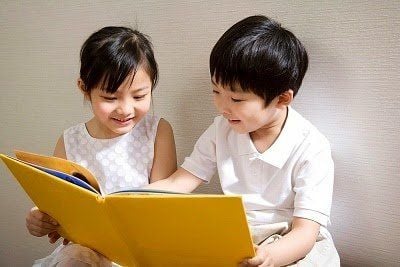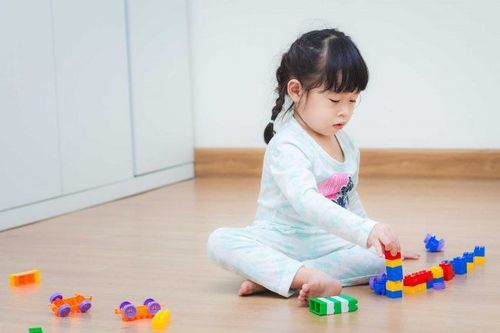This is an automatically translated article.
The article was professionally consulted by Dr. Le Thu Phuong - Department of Pediatrics - Neonatology - Vinmec Hai Phong International General Hospital.Simultaneous learning of 2 languages helps children become more flexible, intelligent, and able to concentrate. According to experts, a high ability to focus attention is the key to academic success and is the highest expression of school readiness in preschool children.
1. The benefits of learning a second language
The American Council on Foreign Language Teaching says that children who learn a second language are more likely to communicate better, are not easily discouraged, and seek to solve problems in a variety of ways.Ingrid Pufahl, Ph.D., a linguist and research consultant, says: “There is a lot of research showing that children who learn a foreign language have amazing growth in cognitive skills, creativity, English, math and science. "These children are also better problem solvers and able to think clearly because they have been exposed to different perspectives and different languages."
The expert added that children do not need to be fluent in a second language for the purpose of enhancing their brain activity because according to her, with the aim of increasing brain activity, even after learning a foreign language for a while. In the short term, children can receive certain benefits.
According to the results of a 5-year study by the Cornell Language Research Center, early learning a second language does not affect the intellectual development of children, on the contrary, it helps children focus and pay better attention while learning. for children who only know their mother tongue. In addition, a second language supports the formation and development of a mother tongue well if it is approached early and by appropriate methods. Learning a foreign language helps children express their mother tongue grammatically, clearly and coherently.
Barbara Lust and colleague, Dr. Sujin Yang, have published their research results in well-known scientific journals. Dr. Sujin Yang has researched for more than 30 years the language learning process of small trre, with more than 20 languages of different cultures around the world. She pointed out that young children can absorb more than one language at the same time very naturally, more freely than we think. Preschool children can learn a second language very quickly when they use the language regularly and actively in the environment they are learning.

Trẻ mầm non có thể học rất nhanh ngôn ngữ thứ 2 khi được sử dụng trong môi trường ngôn ngữ thường xuyên, tích cực mà chúng đang học
Better development of social skills from exposure to other cultures in the world, flexible communication skills and a confident attitude. Better pronunciation skills (both mother tongue and second language). The ability to observe, compare, and compare flexibly because children always translate from one language to another. From birth to 6 years old is the most suitable period for bilingual learning. Through this stage, children have to try harder, but the effect will be less. You can learn more How do children develop language in the first 4 years of life?
2. The secret to helping children learn a second language
Here are a few things you can do to help your child become familiar with and use a second language.Register your child for classes : you can sign your child up for classes during or after school. . Otherwise, look for language programs offered by other schools, cultural centers or services.
Learn with your family: If you are fluent in another language, use that language often at home with your child and encourage your loved one to do the same.
Using the app: A lot of apps that teach English vocabulary to kids can also teach other languages. These apps allow you to choose English, Spanish, French, or German as your primary or secondary language.
Watch the show: Relax on the couch with your kids to watch kid-friendly bilingual shows like Dora the Explorer (Spanish), Ni Hao, Kai-Lan (Mandarin) and Sesame Street (in Chinese) Spain). When the program is over, start talking to your child to encourage him to use the new words he has learned.
Listen and learn: Play music, read books and watch videos or programs in other languages. Drive with your child on a familiar route with voice navigation set in another language and see if they can understand the directions.
Learn with your child: If you are not fluent in the language your child is learning, learn on your own with apps. Practice new vocabulary words with your child.
You can refer to the article How to teach language to children?

Nếu bạn không thông thạo ngôn ngữ mà con bạn đang học, hãy tự học với các chương trình ứng dụng
Outside of school hours, children can watch TV, listen to poems, stories and songs through cassettes. Children can also listen to foreigners talking. There are now many resources for parents to choose from.
Children do not necessarily understand what they hear. Intonation, sound, emotion of words...also help a lot. Children may not fully understand the semantics, but they can distinguish this language from their mother tongue and use their ability to guess to understand the main idea: who is giving orders, who is asking questions, who is having fun... In addition, words are repeated many times with the help of pictures and contexts to help the baby understand their real meaning. For example: stand up, sit down, take, dog... That's the condition. very good for successful foreign language learning later.
Thinking skills help children learn many things quickly, including language. Remember that it is not necessary to focus on teaching a certain language to a preschool child. Children learn in a relaxed, natural way thanks to an ability that psychologists call “cognitive innocence.”
Read comics to children often, both in their mother tongue and in a second language. Organize games in both languages (rotating) so that children can learn and play according to the characteristics of the activity. their awareness.
If you speak this language, talk to your child in both languages. Don't be afraid of your child getting confused. That phase will pass quickly, which helps children become flexible, moving ideas faster than you just learning their mother tongue.

Hãy đọc truyện tranh cho trẻ nghe thường xuyên, cả bằng tiếng mẹ đẻ lẫn ngôn ngữ thứ 2
Does not babble by 12 months of age Does not know how to signal (pointing, waving, shaking hands...) by 12 months Can't say single words by 16 months Does not say 2-word sentences on her own by 24 months (not counting repetition) Loss of language or communication skills at any age Child need to be taken to be examined at Pediatric Psychiatric facilities or Psychiatric facilities with Pediatric Psychiatry. At Vinmec International General Hospital, there is a team of Psychiatric specialists and highly trained psychologists, including in the field of Pediatric Psychiatry, who will examine, evaluate and guide interventions for patients with disabilities. Children with language development problems.
Dr. Vinmec will use the Denver/Raven scale to assess the child's general development, autism assessment scales (if needed), dental examination, otolaryngology, otolaryngology, audiometry, EEG or Brain imaging (if necessary) to comprehensively assess the problem of speech delay in order to provide appropriate diagnosis and intervention strategies. Along with the implementation of psychological tests, intensive psychotherapy is also applied to serve the diagnosis and treatment work, in order to bring the best medical examination and treatment effect.
If you have a need for language testing for children at Vinmec, book an appointment right at the website or contact the hotline system directly for detailed advice.
In addition, school-age children need about 5mg-10mg of elemental zinc/day for them to eat well, reach the correct height and weight and exceed the standard. Zinc plays a role in affecting most biological processes taking place in the body, especially the breakdown of nucleic acids, proteins... Organs in the body when zinc deficiency can lead to a There are a number of diseases such as neurological disorders, irritability, etc. Therefore, parents need to learn about the role of zinc and guide them to appropriate zinc supplements for their children.
In addition to zinc, parents also need to supplement their children with other important vitamins and minerals such as lysine, chromium, B vitamins,... errands.
Please regularly visit Vinmec.com website and update useful information to take care of your baby and family.
Reference source: babycenter.com














